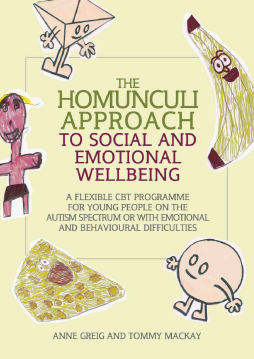
Additional Information
Book Details
Abstract
The Homunculi, (or 'little people'), is a fun activity that builds social and emotional resilience in children and young people, aged 7 upwards, and into the teenage years. It is particularly suited to those with high functioning autism or Asperger's Syndrome who often have difficulty identifying troubling feelings such as anger, fear and anxiety.
The Homunculi are miniature agents with problem-solving missions and special gadgets who live inside the brain and help out with distressing thoughts, feelings and behaviours. Through inventing their own Homunculi characters and stories, participants in the activity learn to cope with their real-life social problems. Complete with a large-format skull poster, character and storyboard templates, and photocopiable record sheets, this unique resource includes everything needed to get started on making Homunculi stories, cartoons or videos.
This flexible, 10-week, CBT-based programme for individuals or groups will be transformative for psychologists, therapists, teachers and other professionals working with children on the autism spectrum or with behavioural difficulties.
Anne Greig is an educational psychologist for Argyll and Bute Council, and a Practice Tutor on the MSc in Educational Psychology at Strathclyde University. She has many years' experience as a teacher, researcher and psychotherapist with special interests in mental health and the autistic spectrum. Tommy MacKay is Director of Psychology Consultancy Services and Visiting Professor of Autism Studies, University of Strathclyde. He has over 40 years' experience in working with children and young people with ASD and other difficulties. His work has won many national awards as an 'outstanding and original contribution to psychology'. He has been described by former UK Prime Minister Gordon Brown as 'an inspiration and a visionary'.
Greig and MacKay have written a practical guide to the Homunculi Approach: an engaging, interactive cognitive behaviour therapy (CBT) programme to help young people build emotional and social resilience. The programme is designed for young people on the autism spectrum or with emotional and behavioural difficulties, aged 8 and above. The book includes extensive resources and guidance for all who might want to run the programme, including psychologists, therapists, teachers, support workers and parents... I would recommend this book to those who work with young people, particularly those on the autistic spectrum. It is a fun, innovative approach to helping building social and emotional well-being, with a strong CBT focus and clear theoretical basis.
Journal of Behavioural and Cognitive Psychotherapy
